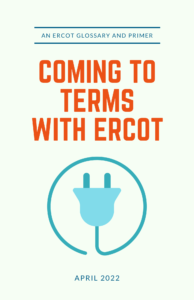The city group recommended that the agency specify how utilities can seek cost recovery for such facilities, assure that affected parties have sufficient time to review such claimed expenses, and to implement other protections.
________________________________________________

For more policy reports, including the ERCOT glossary, click the Resources tab on the OCSC web site.
While agreeing on the potential usefulness of Temporary Emergency Electric Energy Facilities — that is, facilities like large mobile generators that electric utilities can deploy during weather emergencies — a city group has recommended cost safeguards on such facilities to help protect ratepayers.
In documents filed in a rulemaking proceeding at the Public Utility Commission of Texas, the city group recommended that the agency specify how utilities can seek cost recovery for such facilities, assure that affected parties have sufficient time to review such claimed expenses, and to implement other protections. The city group, the Steering Committee of Cities Served by Oncor, or “OCSC,” filed the comments July 18 in response to Proposal for Publication of rules issued in June by the PUC.
Background
Under the state’s retail electric deregulation law, transmission and distribution utilities historically have been barred from owning or operating mobile generation units. In 2021, however, the Texas Legislature adopted House Bill 2483 that grants electric utilities authority to lease mobile generation units for emergency purposes and to recover associated costs from ratepayers. Utilities already have begun to acquire such “TEEEF” units.
The OCSC, a coalition of 160 served by the Oncor utility, has expressed support for the use and cost recovery of such facilities, when appropriate. The OCSC’s new comments focus on proposed cost recovery rules for TEEEF as enumerated in the PUC’s June 13 Proposal for Publication of new 16 Tex. Admin. Code (TAC) §§ 25.56 and 25.59.
OCSC recommendations include:
Cost Recovery
The PUC proposed rule defers the agency’s evaluation of the reasonableness of TEEEF costs to the electric utility’s next comprehensive base rate case. Meanwhile, proposed subsection states that cost recovery may be sought through three types of regulatory proceedings: a stand-alone TEEEF rider proceeding, a separate interim rate procedure known as a Distribution Cost Recovery Factor (DCRF) proceeding, or another ratemaking proceeding appropriate for distribution-related recovery.
However, the proposed rule does not clearly defer cost evaluation to comprehensive proceedings, as stated in the rule’s introduction. As such, the OCSC recommended a clarification on when an electric utility can recover costs versus when costs undergo a prudence evaluation and whether or when these two assessments can be contemporaneous. The city group also noted that DCRF proceedings do not provide adequate time for a prudence evaluation of potentially multi-million-dollar TEEEF costs, and that if an electric utility requests cost recovery in such a proceeding, then the prudence review should be deferred to a comprehensive rate proceeding. “To protect ratepayer interests and ensure reasonable rates, the Commission and affected parties should have a reasonable amount of time to evaluate TEEEF costs,” the city group stated in its comments.
Contested Case and TEEEF Rider Proceeding
The OCSC noted that the proposed rule permits cost recovery through a standalone TEEEF rider proceeding but does not specify procedural parameters for such a proceeding. As such, the OSCC called for more specifics. The OCSC further recommended that TEEEF rider proceedings specifically allow intervention by affected parties and allow sufficient time for affected parties to evaluate the prudence, reasonableness, and necessity of requested TEEEF costs.
Post-Deployment Report
A report required in the proposed rule should be subject to a filing deadline within a reasonable amount of time after the deployment of TEEEF units, according to OCSC. The city group also recommended that the PUC require that such reports state whether the TEEEF was energized and, if so, how many megawatts were energized.
Find more information about this proceeding on the PUC website, under Docket #53404.

